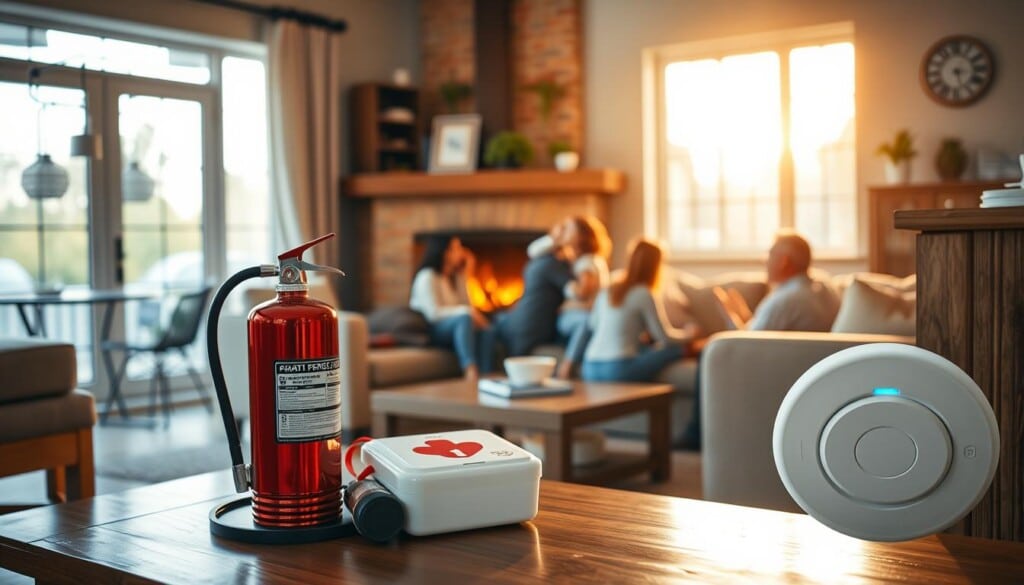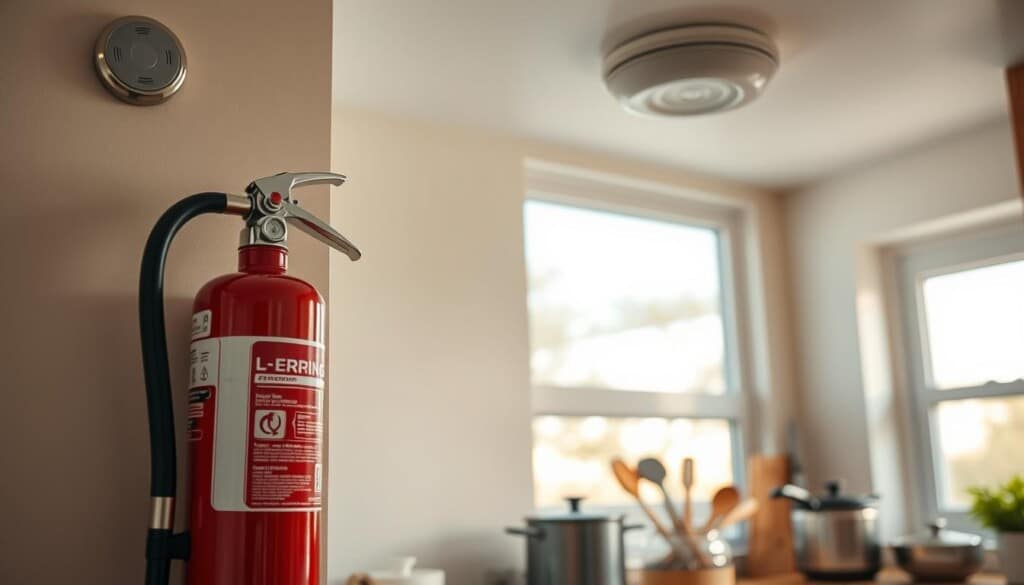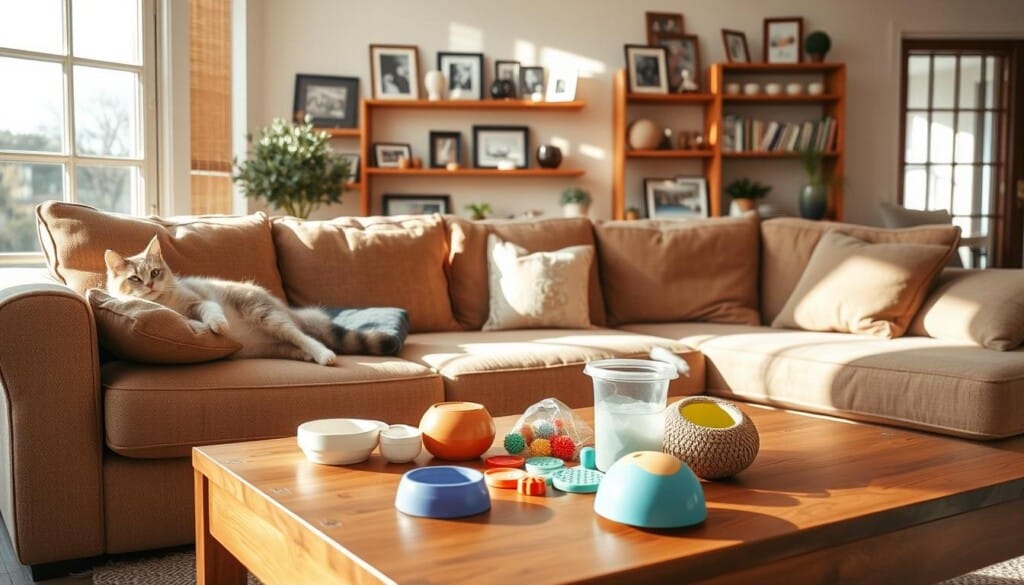Is your home ready for unexpected emergencies? Knowing about Home Safety is key to a safe living space. In today’s world, it’s vital to focus on home safety to avoid accidents and dangers. This guide offers a detailed checklist to help make your home safer.
It covers everything from simple safety steps to more advanced measures. These tips will help prevent accidents at home. They show how important it is to stay alert in our daily lives.
With the right steps, we can all help make our neighborhoods safer. Check out LocalZ for local services and home safety advice. Get ready to learn important ways to protect your family and home.
Key Takeaways
- Understanding Home Safety is essential for secure living.
- Regularly assess and implement safety tips for home.
- Maintain a thorough home safety checklist.
- Prioritize prevention strategies to avoid accidents at home.
- Engaging local resources can greatly enhance safety measures.
Understanding Home Safety and Its Importance
Home safety is key to a secure living space. It includes all steps taken to protect people from harm. Knowing why home safety matters helps make homes safe for everyone.
Definition of Home Safety
Home safety goes beyond just physical safety. It also means feeling emotionally and financially secure. By taking safety steps, we can make homes safer for families.
The Impact of Home Incidents
Home incidents like falls, fires, or burglaries can be very harmful. Almost one in four older adults fall each year. These incidents can cause serious injuries, emotional pain, and big financial losses.
Why Home Safety Matters
Understanding the value of home safety motivates us to take action. A safe home improves our well-being and reduces stress. It makes life better for everyone living there. By spreading the word, we can help people protect their homes.
Essential Home Safety Measures
It’s vital to have safety measures in your home to avoid dangers. The right devices give early warnings and stop big problems. Make sure you have smoke detectors, carbon monoxide alarms, and check fire extinguishers often. This will make your home much safer.
Installing Smoke Detectors
Putting in smoke detectors is key to keeping your home safe. The National Fire Protection Association (NFPA) says to put smoke alarms in every bedroom and on each floor. Test them every month and change the batteries once a year to keep them working.
Using Carbon Monoxide Alarms
Carbon monoxide alarms are important for finding this dangerous gas. Every home needs at least one near where people sleep. Check and clean these alarms often to protect against health dangers from carbon monoxide.
Regularly Checking Fire Extinguishers
Checking fire extinguishers is a big part of keeping your home safe. They should be easy to see, get to, and in good shape. Check them every month to make sure they’re ready to use. A good extinguisher can stop fires in your home.

Securing Entry Points
Keeping your home safe means securing entry points. Strong security measures can stop unwanted visitors. One good way is to make doors and windows stronger.
Installing deadbolts and window locks can block intruders. Smart security systems also help. They offer remote monitoring and alerts, making your home safer.
Strengthening Doors and Windows
Boosting door and window strength is key. Use strong materials for doors and reinforce frames to stop break-ins. High-quality window locks add extra protection.
Homes with these features show they’re serious about safety. They’re ready to face any threats.
Utilizing Smart Security Systems
Smart security systems are vital for home safety today. They have motion detection, cameras, and remote access. This lets you watch your home from anywhere.
Adding smart tech to your home’s security gives you peace of mind. It also scares off criminals.
The Role of Outdoor Lighting
Outdoor lighting is a big help in keeping your home safe. Bright paths and entry areas are welcoming and keep intruders away. Lights, including those that turn on when someone moves, make sure all areas are seen.
Fire Safety Practices
Keeping lives and property safe is key. A good family escape plan is vital. It shows clear exit routes and where to meet up. Being careful with candles and checking electrical systems often are also important steps.
Creating a Family Escape Plan
Having a solid family escape plan is critical. It should outline how to leave each room quickly. Practicing these routes often helps families act fast in emergencies.
Safe Use of Candles and Appliances
Using appliances and candles safely is important. Always watch them closely to avoid accidents. Choosing flameless candles is a safer option.
Regular Electrical System Inspections
Checking your home’s electrical system often is a must. It helps find and fix problems before they cause fires. Get a pro to do these checks to keep your home safe.

Childproofing Your Home
Childproofing your home is key to keeping young children safe. By taking the right steps, parents can lower the risks of accidents. This includes using safety gates, storing dangerous items safely, and making sure furniture doesn’t tip over.
Safety Gates and Child Locks
Safety gates are a must for childproofing your home. They block off areas like stairs, where falls can happen. Also, using child locks on cabinets is important. These locks stop little ones from opening cabinets with harmful stuff inside.
Storing Hazardous Materials
Storing dangerous items right is also vital. This means keeping medicines, cleaning products, and other harmful substances out of reach. By doing this, you can avoid accidents and make your home safer for kids.
Furniture Stability and Tipping Hazards
Checking if furniture is stable is important to avoid tipping hazards. Childproofing means making sure big furniture like bookshelves or dressers are tied to the wall. This helps prevent them from falling over, making your home safer for kids.
Pet Safety at Home
Keeping pets safe at home is key for their well-being and yours. Taking steps early can lower risks from common dangers. This means using strategies to keep pets safe and ready for emergencies.
Keeping Dangerous Items Out of Reach
Identifying and keeping harmful items away is vital. Things like cleaning supplies, toxic plants, and certain foods need to be out of reach. This prevents pets from getting into them, making your home safer for them.
Safe Spaces for Pets
Having a safe spot for pets helps them feel secure. This area should have comfy bedding, favorite toys, and familiar smells. It helps keep them calm and reduces the risk of accidents.
Emergency Preparedness for Pets
Being ready for emergencies is essential for pet safety. Owners should have a kit with food, water, meds, and other essentials. Knowing local vets and having a plan ensures pets stay safe in unexpected situations.

The Need for Emergency Preparedness
Being ready for unexpected situations is key. A good emergency kit can really help when trouble comes. It should have food, water, medicines, and first-aid supplies. This way, people can take care of themselves when things get tough.
Developing an Emergency Kit
Building a solid emergency kit takes thought. You’ll need non-perishable food, water, and medicines. Don’t forget personal documents, flashlights, and batteries. Every family should tailor their kit to their needs and local risks.
Establishing Communication Plans
Good communication is vital in emergencies. Having clear ways to talk to each other can help a lot. Make sure everyone knows where to meet and how to use phones or other ways to stay in touch. This keeps families connected when it counts.
Regularly Reviewing Safety Procedures
Keeping safety up to date is important. Families should check their safety plans often. This helps them stay ready for new challenges and keeps everyone safe.
Neighborhood Safety Awareness
Making our neighborhoods safe is key to a secure community. By working together, we can all help keep our area safe. This means better living for everyone.
Engaging with Local Community
Getting involved in local events helps us connect. When we know our neighbors, we watch out for each other. This way, we can all help keep our community safe.
Building a Neighborhood Watch
Starting a neighborhood watch is a great way to stay safe. It lets us keep an eye out for anything odd. This helps prevent crime and brings us closer together.
Sharing Information with Local Law Enforcement
Telling the police about our concerns helps them act fast. This builds trust and makes our community safer. Working together, we can all feel more secure.
Utilizing Local Resources for Safety
Improving home safety means using local resources available in your area. Connecting with local service providers ensures quick access to needed expertise. LocalZ helps connect people with local experts in home safety solutions. Supporting local businesses boosts community well-being and ensures access to skilled professionals.
Connecting with Local Service Providers
Starting with local resources for safety involves finding service providers near you. These experts offer custom solutions to improve home safety. Working with them makes your home safer by addressing specific needs based on local conditions.
The Role of LocalZ in Finding Experts
LocalZ is an online directory that makes finding local experts easy. It allows users to browse profiles and reviews, helping make informed choices. This platform is key for effective home security strategies.
Supporting Local Businesses for Safety Needs
Supporting local businesses is key to community safety and resilience. Choosing local service providers helps the local economy and ensures quick access to experts. This strengthens community ties and encourages businesses to work together on safety issues.
The Community Impact of Home Safety
Investing in home safety greatly affects the community. It makes people feel safe and connected. Studies show that better home safety leads to less crime. This makes the community safer, helping everyone feel more at home.
How Safety Reduces Local Crime
Good home safety stops criminals, lowering crime rates. When homes are secure, criminals are more likely to get caught. This makes the whole neighborhood feel safer, encouraging people to get involved in their community.
Community Programs and Initiatives
Community programs are key to keeping neighborhoods safe. They work with local businesses, schools, and groups. These partnerships help spread the word about safety, making it easier for people to protect their homes.
The Benefits of Local Partnerships
Working together in the community makes safety efforts stronger. Local businesses joining in builds trust and communication. This teamwork makes the community safer for everyone, creating a better place to live.
Conclusion and Call to Action
Securing your home is key to safety. This includes locking doors, using alarms, and having emergency plans. Knowing about community resources like LocalZ can also help make your home safer.
Being part of your community is important for safety. Joining LocalZ lets you connect with experts and services. This helps everyone stay safe and builds a strong community.
Creating a safe community takes teamwork and knowledge. Use local resources and follow safety tips to help. If you want to get involved, join LocalZ today. It’s a big step towards a safer neighborhood.

